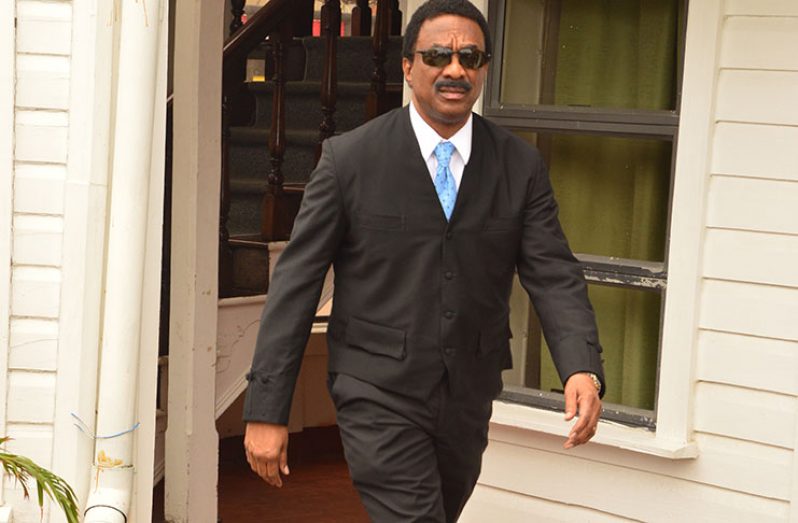—-AG maintains government cannot hold elections
…says provision in Article 106 (7) is an absurdity
ATTORNEY General, Basil Williams SC said that the provision of Article 106 (7) in the Constitution, which requires that the government hold election within three months is tantamount to giving the administration a task of Sisyphus.
Sisyphus was a cruel Greek king who was punished to push a large rock up on a steep hill, only to find it rolling back on nearing the top. Williams made the comments during his arguments in the appeal case against the decision of the High Court in the no-confidence motion.

Addressing this critical issue before Chancellor of the Judiciary (ag), Justice Yonette Cummings-Edwards and Justices of Appeal Dawn Gregory and Rishi Persaud the Attorney General who appeared in association with Queen’s Counsel Dr Francis Alexis, the Solicitor General Nigel Hawke, and Attorneys-at-Law Maxwell Edwards and Mayo Robertson, told the court that the Government cannot hold elections when GECOM is the constitutional agency established to do such.
He said Article 106 (7), states that Government shall “hold” elections within three month or at a time agreed upon by two-thirds majority of all members of the National Assembly but the Attorney General argued that a literal interpretation of the word or the provision would produce more or less an absurdity. Under the current construct of the Constitution, only GECOM can hold and supervise the conduct of elections independently.
In support of his position, the Attorney General referenced to Article 62, Article 161 (A) and (B) and Article 162. It was emphasised that the Constitution insulates GECOM from political interference.
“What happened in the Court below was that Article 106 (7) was looked at separately and in isolation of the other provisions of the Constitution…Your honours when you read Article 106 (7) in isolation, what do you find? We find that the Government is given a task, that one could say is a task equivalent to Sisyphus, impossible of performance because of course the government cannot hold an election, it is an absurdity,” he told the Court.
He maintained that Article 106 (6) and Article 106 (7) conflict with the provisions related to GECOM. However he noted that the two sub-articles are directory and not mandatory. He pointed out that the Chief Justice in the case of the Attorney General v The Speaker of the National Assembly and others specifically said that the President and the Ministers cannot remain in office after the three months expire and no elections are held. Interjecting, the Chancellor turned Williams’ attention to the other part of Article 106 (7) which allows for an extension of the timeframe given by a two-thirds majority. But the Attorney General said putting politicians to work together during an election period is a difficult task.
“… (It) surprises me that inherent in Article 106 (7) as an alternative to the three months, is to have an engagement that requires a two-third majority which is a virtual impossibility, if you take into account the history of this country since independence,” the Attorney General told the Chancellor. According to him, such a requirement is even higher than the absolute majority requirement.
Attorney-at-Law Roysdale Forde, who is representing General Secretary of the A Partnership for National Unity (APNU), Joseph Harmon, though applying a different formula, agreed that the Cabinet and Government must only resign when a new President is sworn in. He also underscored the critical role of Cabinet in the day to day functioning of the Government.
Meanwhile, Attorney Edwards told the court that the Chief Justice misdirected herself in law when she ruled that Article 70 (3) of the Constitution does not guarantee an elected government a term of five years. He submitted that Article 8 of the Constitution states that if any other law is inconsistent with it, that other law shall to the extent of its inconsistency be void.
“Our respectful submission your honours, is that Section 5 of the Constitution of the Amendment Act No. 17 of 2000 which introduced the No Confidence motion into our Constitution of jurist prudence is inconsistent with Article 70 (3) of the Constitution,” which guarantees an elected government a five- year term in office.
He alluded to the fact that Article 70 (3) was embedded in the 1980 Constitution, and it was only 20 years after that Article 106 (6) and Article 106 (7) were inserted in the Constitution in 2000. Edwards said that the inserted articles seek to allow for a defeat of a Government which is guaranteed five years under Article 70 (3) to that extent it subverts, dilutes, and waters down that five-year term. He is of the opinion that the elected Government has “an absolute right” to a five-year term in office and that term cannot be cut down by a resolution by 34 members of the National Assembly.
Anil Nandlall, who is representing the Opposition Leader, Senior Counsel Rafiq Khan who appeared on behalf of the Speaker of the National Assembly, Dr. Barton Scotland who was also present, Kamal Ramkarran – Christopher Ram’s attorney and Sanjeev Datadin were among the attorneys present in the court room on Tuesday. Arguments will continue today in the cases Attorney General v Christopher Ram and others, and Attorney General v The Speaker and others.



.jpg)








